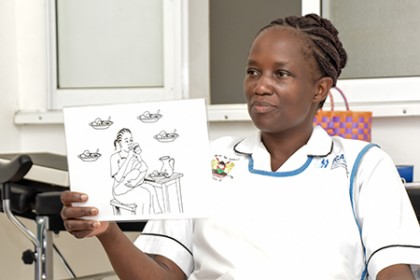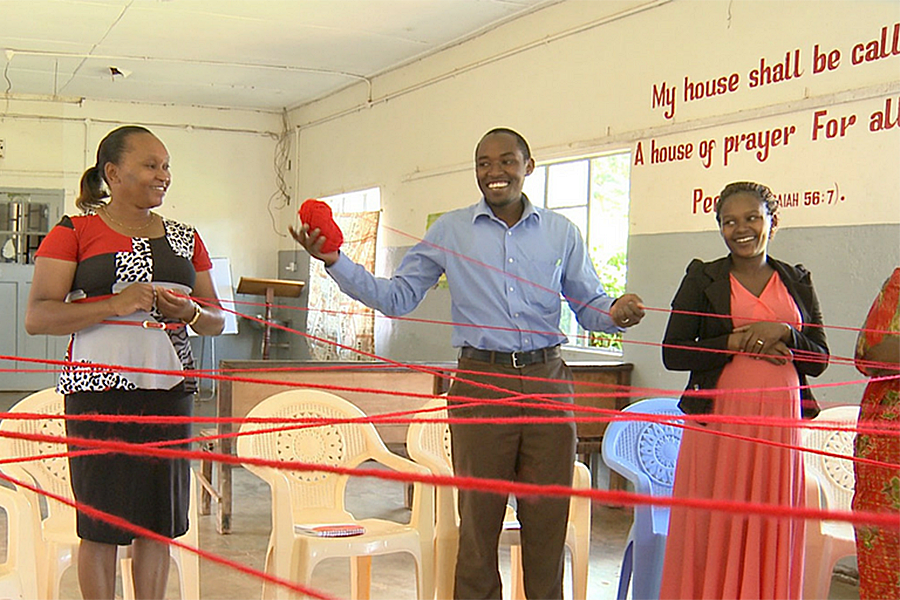Lindsay Grenier is a maternal health advisor and Cole Bingham is a communications specialist for Jhpiego, a Johns Hopkins global health affiliate. This blog entry originally appeared on the Global Moms Challenge blog.
The pregnant women stand in a circle, tossing a ball of yarn back and forth. One woman catches it, introduces herself, shares her favorite pastime—then takes hold of an end and lobs the yarn ball across the group to another woman. As the yarn unravels, stories unfold and the women in this Kenyan health center see a visual representation of how pregnancy connects them.
It's through this exercise that pregnant women first get to know each other during their group sessions for expecting moms—referred to by public health experts as group antenatal care. Bringing pregnant women together to discuss the childbirth and breastfeeding is helpful for women in Kisumu and Machakos counties in Kenya and in Nasawara state, Nigeria, to readily access services that can help ensure a safe delivery and a healthy baby. In many developing countries, women don't routinely attend the recommended minimum four group sessions and screenings for HIV/TB, malaria, and other diseases.
Support groups promote these services and healthy behaviors such as breastfeeding, early newborn care, and birth spacing for a positive and safe birth experience. Participants have brief private consultations with their midwife, and then spend the majority of their session engaged in group discussion and activities to share information and build bonds other expecting moms.

Image caption: Lorna Othola, a nurse at Ahero Sub-County Hospital, displays a card showing a method of holding a breastfeeding baby
Image credit: Jhpiego
They get important information about caring for infants, particularly about the importance of breastfeeding. Breast milk contains everything a baby needs in the first six months of life and protects against illnesses like pneumonia and diarrhea. This is especially important in places like Kenya and Nigeria where infection rates are high. However, as in countries all over the world, many women don't know about or aren't able to follow through on these practices for a number of reasons. Group sessions help expecting mothers anticipate and problem solve for potential barriers, like a mother-in-law who thinks solid food will help a baby sleep better.
At these group sessions, the facilitator might use a doll or videos to demonstrate good breastfeeding positions—the cradle, cross-cradle, clutch or football, or side-lying—and discuss concerns or misconceptions the expectant mothers might have. Such advice and lessons have proven to be helpful to women who are encouraged to follow through, says midwife Jenipher Ang'aha, who works with expecting moms in Kenya. When new moms meet following the birth of their babies, they "talk about how the babies breastfeed, like, 'My baby does not give me time to rest,'" she says. "The rest respond and say, 'You must eat and drink a lot of porridge and soup…otherwise you will be very thin and weak.' Those with first babies learn a lot from the mothers with experience."
During their group sessions, women are encouraged to share their new knowledge with their families, and identify the areas to keep a close watch on in the months following childbirth. At their last meeting, the women again stand in a circle and toss yarn back and forth. No longer in need of introductions, they share a wish for childbirth or a hope for their new friends' families. Then they cut small pieces of the yarn and tie them around their wrist as a reminder not only of what they've learned, but also of the relationships they've built.
"I just like the way mothers encourage one another freely," Ang'aha says.
Posted in Health, Voices+Opinion
Tagged jhpiego, pregnancy, maternal health, infant health








